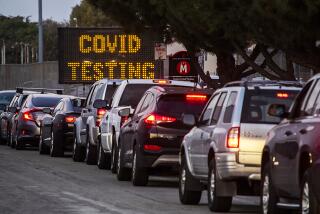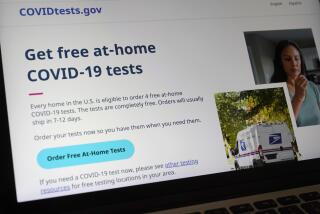Officials Urge Millions More to Take AIDS Test
WASHINGTON â Federal health officials urged Thursday that millions of potential carriers of the AIDS virus voluntarily take tests as part of an effort to combat spread of the deadly disease.
Such examinations would greatly expand AIDS testing--which up to now had been recommended only for members of certain groups, such as potential blood donors and pregnant women--to cover all members of groups most likely to contract AIDS, including homosexual men and intravenous drug users.
The tests detect the presence of AIDS antibodies but do not necessarily mean that a person has the disease itself.
When members of high-risk groups visit health care facilities, they âshould be routinely offered counseling on their risks--as well as the opportunity, through testing, to know their antibody status and take appropriate action based on that knowledge,â Walter R. Dowdle, AIDS coordinator at the U.S. Public Health Service, said at a news conference.
âHigh-Riskâ Establishments
Officials distributed copies of a report from the federal Centers for Disease Control, which contained recommendations to stop the spread of the disease, most of which have already been made to state and local officials. For example, the federal officials endorsed the controversial idea of regulating or closing âhigh-riskâ establishments, such as bathhouses and brothels.
But the new test recommendation was immediately criticized. In New York, Ronald Najman, media director of the National Gay and Lesbian Task Force, said the group was âconcerned that resources at various levels of government might be withdrawn from education efforts that have proven to be effective and directed to testing programs that have not been shown to influence behavior.â
Dr. Donald R. Hopkins, deputy director of the CDC, who also attended the news conference, sought to refute charges that the test is medically unreliable. Health officials have âgreat confidence in this test,â which has been used widely during the last year to screen blood donors, he said. Most people in high-risk groups who repeatedly test positive âare infectious,â Hopkins said.
Acquired immune deficiency syndrome attacks the bodyâs immune system, making a person vulnerable to diseases that otherwise would not be fatal. As of March 10, 18,070 cases had been reported nationwide. Of those, 9,591 have died.
No Known Cure
There is no cure for the disease, which is transmitted by an exchange of bodily fluids. In addition to homosexual men, the CDC list of those at risk includes female prostitutes and their sex partners and persons born in Haiti and central Africa--members of groups whose role in spreading the disease has been widely debated.
Officials at the news conference said that they did not know when a cure would be found. However, scientists are reporting that an anti-viral drug tested on 19 AIDS patients improved the functioning of immune systems, decreased fevers and cleared up infections.
The results of tests involving the drug, azidothymidine, are reported in the March 15 issue of the British journal Lancet. But scientists caution that the improvements have been observed for only a short time.
More to Read
Sign up for Essential California
The most important California stories and recommendations in your inbox every morning.
You may occasionally receive promotional content from the Los Angeles Times.










